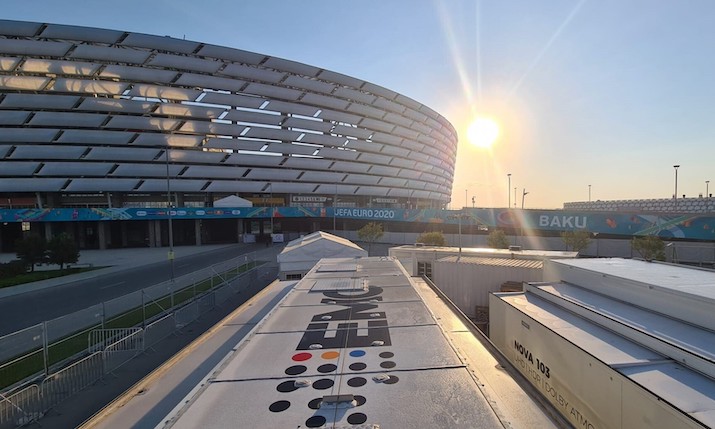Industry challenges: EMG looks at the growing importance of sustainability in live production

EMG OB trucks in front of Baku Stadium during UEFA Euro 2020
By Shaun Gregory, chief executive officer, EMG Group.
The pandemic challenged the industry as nothing else has done before or since. We have become used to dealing with rapid and sudden changes in technology, business models, and even consumer behaviours over recent years. But to compress the R&D of fully embracing remote production workflows all the way up to top tier sports into a couple of months has been an astounding achievement.
Remote production is very much here to stay as a result. COVID made it a necessity and its cost effectiveness means that there is no way that the industry will be willing to go back to the previous models. It has had additional benefits though that will prove to be even more significant overall. And one of the key areas there – and one of the main underlying trends that will shape the industry through 2022 – is sustainability.
A greener world
The COP26 conference at the end of 2021 highlighted just how important sustainable models of production are across all industries. Broadcasting is no exception. At the moment there is little legislation in the area, but as the urgency of limiting emissions to arrest global warming increases, so we can expect sustainable business practices to become increasingly mandated in turn.
Broadcasters are ahead of the curve on much of this, with several pioneering companies already realigning their operations and ensuring any new infrastructure builds meet best environmental practices.
Film and TV production is already onboard too. Indeed, work undertaken by industry sustainability body, albert, in the UK helped contribute to a 10% drop in the amount of carbon one hour of TV contributes to the atmosphere between 2017 and 2019.
It is the figures from the latest Annual Review from albert covering May 2020 to April 2021 that really grab the attention though. During that COVID-impacted period, the average emissions per hour of television dropped 52% from 9.2tn CO2e to 4.4tn CO2e.
Moreover, for events/OB it was even greater. Emissions associated with an hour of events/OB in 2020 were a third of what they were in 2019 due, according to albert’s calculations, to a decrease in travel and accommodation emissions (down by 78% and 90% respectively).
The report states: “But if some positives can be taken away from 2020, then it must be that there are alternative ways to work which still allow our industry to continue to make excellent programmes, while limiting our impacts on the planet.”
Changing the game
This is where remote production obviously has made an enormous impact, but the important consideration is that it can be better too. At the moment when we consider sustainability, we are in the main thinking of being carbon neutral. We now need to take this a step further and look to becoming net zero.
The distinction between the two approaches is important. With carbon neutral, organisations simply purchase the equivalent amount of carbon reduction credits to balance emissions in tree planting schemes and so on. Net zero takes this all a significant step further and involves a concerted attempt to reduce emissions first; only then is any remaining balance offset.
That means we must look at everything we do at a much more granular level. It is both big things and small things, the macro and the micro. From the fuel we use in our generators – biodiesel and even hydrogen powered ones are increasing realistic alternatives – to the food choices and even the cutlery we use to feed the crews that must work on-site. Does every match need the full camera package? Could some of those cameras be switching to robotic units? Can we maximise the uptime of production hub gallery equipment with global contracts so that we can run them effectively 24/7?
Not sending the pre-COVID levels of trucks, crews, and equipment to venues is a particularly good start in all this endeavor, but there is more work to be done. You can even argue that as an industry we have a responsibility to step up when it comes to sustainability. In the same ways that sports bodies are on the frontline when it comes to campaigns against discrimination and championing diversity, so the content we produce is in front of millions of viewers each and every weekend; and the more sustainably produced that content is the more powerful the message that gets across.
As an industry we would be wise to act now too while we can remain in charge of the process. That way when sustainable practices are demanded by viewers and governments alike, we can be ahead of the curve and proud of the fact that we are part of the solution and not the ongoing problem.
